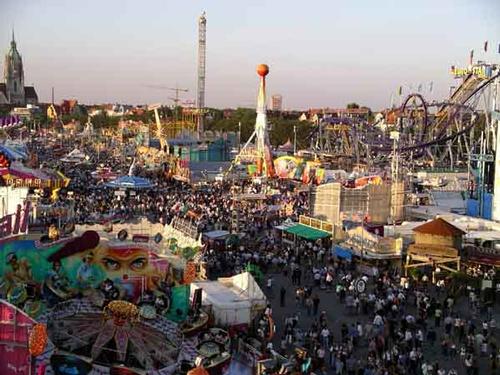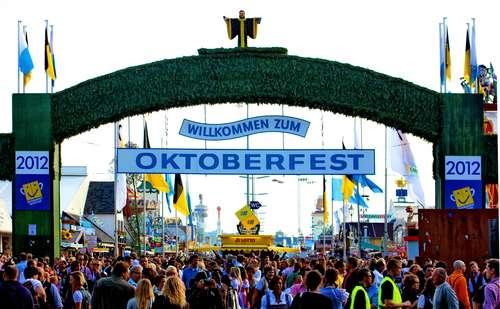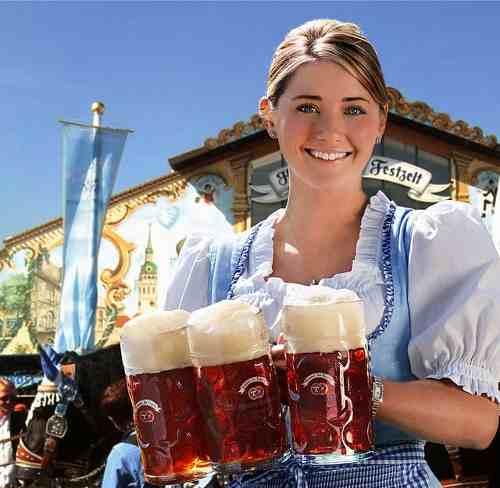BAVARIA
Population

Population

Cities in BAVARIA
| Munich |
Popular destinations GERMANY
| Bavaria |
Population
General
 Oktoberfest Munich BavariaPhoto: Michael.chlistalla CC 3.0 Public License no changes made
Oktoberfest Munich BavariaPhoto: Michael.chlistalla CC 3.0 Public License no changes made
Bavaria consists of four 'tribes', the Altbayern, the Franks, Swabians and the Sudeten Germans who moved to Bavaria after the Second World War. The approx. 6.5 million Altbayern live in the Regierungsbezirke Oberbayern, Niederbayern and the Oberpfalz; the approx. 4.2 million Franks live in the Regfierungsbezirken Ober-, Mittel- and Unterfranken and have belonged to Bavaria since the early 19th century. The 1.9 million Bavarian Swabians live in the Regierungsbezirk of the same name. After the Second World War, about two million refugees, mainly Sudeten Germans, and so-called 'Heimatvertriebene' moved to Bavaria and built a new future there as a 'fourth tribe'. Immigration from other German states is much higher than in the rest of Germany. In the last 25 years, more than a million people have moved from the other federal states to Bavaria.
Bavaria had approximately 13,5 million inhabitants oin 2024, the largest population except for the state of North Rhine-Westphalia, and a population density of 200 inhabitants per square kilometer. This means that about 16% of all Germans live in Bavaria. Bavaria has more inhabitants than, for example, a country like Sweden with about 10 million inhabitants. The population of Bavaria is still growing, since 1840 the population of Bavaria has tripled. After the 1970 census, more than 10 million people were counted in Bavaria for the first time.
The largest city and only million city in Bavaria is Munich with more than 1.4 million inhabitants. In terms of population, Munich is the third largest city in Germany after Berlin and Hamburg and the twelfth city in the European Union. Munich is the most densely populated city in Germany with 4,600 inhabitants per km2. With more than 500,000 inhabitants, Nürnberg is the second city in Bavaria (14th city in Germany), Augsburg is the third city in Bavaria and 23rd in Germany with more than 280,000 inhabitants. Bavaria has eight cities with more than 100,000 inhabitants (see overview below).
20 grootste steden van Beieren
| city | population1-1-2015 | city | populationl 1-1-2015 |
| Munich | 1.429.584 | Achaffenburg | 68.167 |
| Nürnberg | 501.072 | Landshut | 67.509 |
| Augsburg | 281.111 | Kempten (Allgäu) | 65.624 |
| Regensburg | 142.292 | Rosenheim | 60.889 |
| Ingolstadt | 131.002 | Neu-Ulm | 55.689 |
| Würzburg | 124.219 | Schweinfurt | 51.610 |
| Fürth | 121.519 | Passau | 49.952 |
| Erlangen | 106.423 | Straubing | 46.027 |
| Bamberg | 71.952 | Dachau | 45.985 |
| Bayreuth | 71.601 | Freising | 45.857 |
Oktoberfest
The most famous festival in Bavaria is of course the world famous Oktoberfest. This gigantic (beer) festival is held every year for sixteen days until October 6 on the 42 hectare Theresienwiese or 'Wiesn' in Munich. This party, with more than thirty large and small beer tents, annually attracts about 6.5 million visitors who all together beat about 7.5 million liters of beer.
The folk costume consists of the 18th century 'Dirndl' for the women and the 'Lederhose' for the men. The Oktoberfest originated in the early 19th century on the occasion of the wedding of Ludwig I of Bavaria to Therese von Sachsen-Hilburghausen. A horse race was organized on the site in 1810, and this was later expanded by the Oktoberfest.
 Main entrance Oktoberfest, Munich, BavariaPhoto: Usien CC 3.0 Unported no changes made
Main entrance Oktoberfest, Munich, BavariaPhoto: Usien CC 3.0 Unported no changes made
On the first day of the party, a procession including beautiful horse-drawn beer wagons from all cooperating beer breweries will pass through Munich city center in the direction of the party area. Once there, the party is traditionally opened in the Schottenhamel, the oldest beer tent of the Oktoberfest, by the mayor of Munich. After the mayor's exclamation 'Ozapft is' (it's tapped!) When the first beer mug has been tapped, the party can start at exactly 12 noon.
All the beer that is served, often special Oktoberfest beer with an alcohol content of at least 5.8%, must be brewed in Munich, which means that only six breweries can participate: Hofbräu-München, Paulaner, Löwenbräu, Augustiner, Hacker -Pschorr and Spaten. In addition to beer, some 90,000 liters of wine are also served, all with the help of 12,000 serving staff. The largest beer tent ever was that of Bräurosl in 1913 with 12,000 seats.
 Waitress with three mugs of Hacker-Pschorr beerPhoto: Markburger83 in the public domain
Waitress with three mugs of Hacker-Pschorr beerPhoto: Markburger83 in the public domain
Sources
BBC - Country Profiles
CIA - World Factbook
Di Duca, Marc / Munich, Bavaria & the Black Forest
Lonely Planet
Egert-Romanowska, Joanna / Duitsland
Van Reemst
Meyer, Marion / Beieren
ANWB
Oberbayern : bayerisches Alpenvorland
Baedeker
Wikipedia
Copyright: Team The World of Info